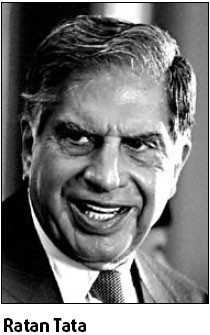Can tycoon Tata pull it off yet again?
Indian business baron Ratan Tata has proved detractors wrong before, and needs to do it again as he parks luxury car brands Jaguar and Land Rover in an auto empire that includes the world's cheapest car.
His Tata Motors, which was set up to make locomotives at the end of World War Two, on Wednesday agreed to buy Jaguar and Land Rover from Ford Motor in a $2.3 billion deal that catapults it on to a podium of elite automakers.
Ten years ago Tata Motors unveiled its first car, the indigenously made Indica hatchback, silencing critics who thought the bus and truck maker wouldn't pull it off.
Tata's business acumen was again questioned when he announced plans five years ago to build the world's cheapest car.

In January, Tata drove a Nano, priced at just above $2,500 - or about half the price of the cheapest car on the market - on to a stage in New Delhi to a rock star reception. Analysts have questioned his next step as well, the plan to join luxury marques with Tata's staid line-up of cheap, boxy cars and sturdy buses.
But Tata has shown he has the stomach for a fight.
Scion of one of India's best-known business families, Tata landed the biggest deal in the Indian auto industry just a year after pulling off the country's biggest ever takeover, a $13 billion purchase of UK's Corus Group by Tata Steel.
"They have shown they have the appetite for big purchases and the ability to digest them," said an analyst who tracks Tata Motors and asked not to be named.
High point
Tata studied architecture at Cornell University and management at Harvard before spearheading Tata Motors' foray into cars, a move that was ridiculed by analysts and the industry.
The initial rollout of the Indica was far from successful, with Tata joking later he was afraid even to walk his dogs because irate customers would accost him to complain about parts that rattled and doors that did not shut.
The Indica has since sold more than 1 million units, and the company, which just some years ago was in the red, then launched the Indigo sedan in 2002, a car Tata sometimes drives to work.
A licensed pilot who occasionally flies the company plane and took a spin in an F-16 fighter jet last year, Tata described the launch of the Nano as a "high point".
"There's a sense of achievement and vindication. There's also a rush of adrenaline," he said in January at an auto show in Delhi where the snub-nosed Nano was unveiled.
But he will not be seen cruising Mumbai's crowded streets in a Jaguar anytime soon. Tata, 70, does not court media attention and steers clear of Mumbai's glitzy party circuit.
Quiet life
A conservative dresser, he has lived alone in the same upmarket apartment building for years and goes to work in a black Mercedes or Indigo, sitting beside his driver.
He received one of India's highest civilian awards in 2000.
A member of the small but prosperous Parsi community known for its love of music and arts, Tata upholds the family reputation for treating employees fairly and not paying bribes.
"Tata seems to be very good at nurturing firms," said Ian Fletcher, an analyst at Global Insight in London.
Unite, the main union representing workers at Land Rover and Jaguar, had said their "long-term future is best served by Tata".
The Tata group has interests spanning energy, hotels, retail, broadcast, software and telecoms. It is India's second biggest company by market value behind energy behemoth Reliance Industries Ltd.
Tata himself is ranked among the world's 25 most powerful businessmen by Fortune magazine and credited with transforming the sprawling conglomerate of more than 300 firms into a corporate powerhouse after he took over as chairman in 1991 from his uncle J.R.D. Tata.
Now Tata Sons, the holding company owned largely by charitable trusts, oversees 98 group firms.
Leaner and more modern, the group is not afraid to make big buys: Tata Tea bought UK's Tetley Tea for $432 million and last year Tata Power paid $1.3 billion for stakes in Indonesian PT Bumi Resources Tbk's two coal mines. Due to retire in 2012, he has said his successor need not be family.
Asked in a recent newspaper interview if he had fire in his belly for a further five years, he replied: "Not really".
"In an ideal world, after the small car has been launched and is successful, that would be a nice time for me to exit."
Agencies
(China Daily 03/28/2008 page17)














